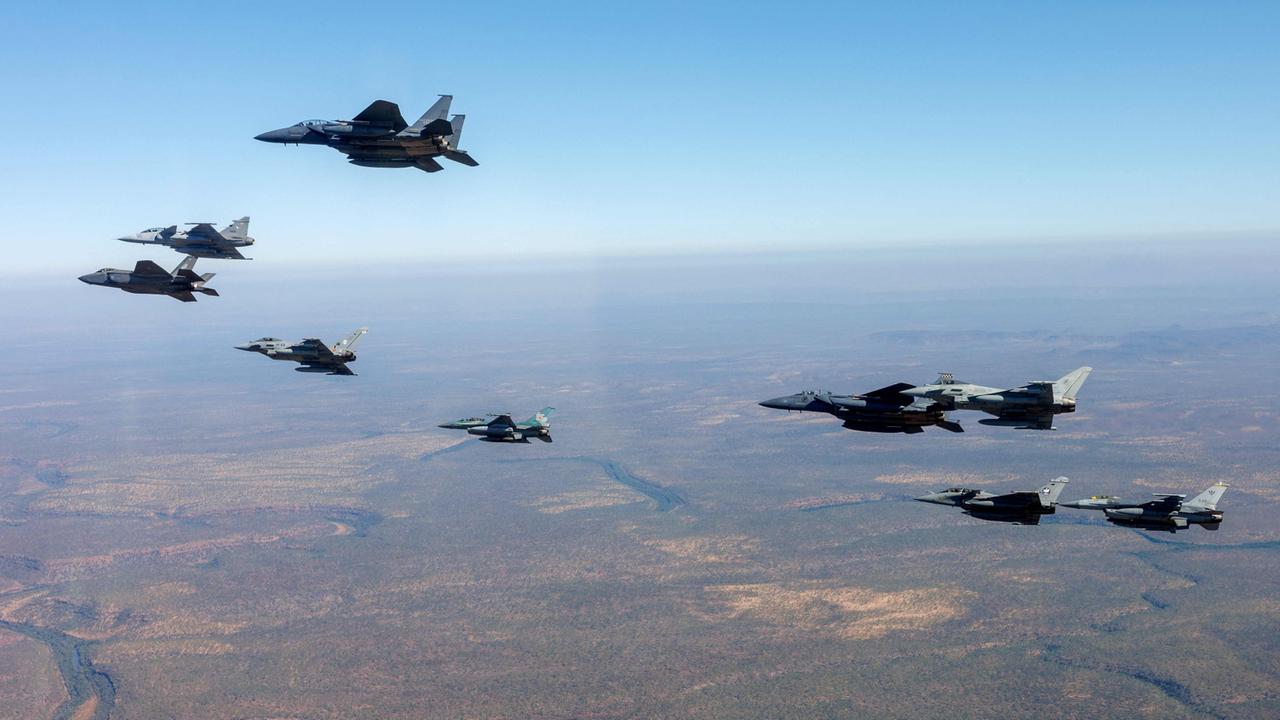A huge military exercise is taking place in Australia – and the German Air Force is also involved. The main aim is to send a political signal due to the increasing tensions in the region with China.
Every minute, jet planes thunder over Darwin, the otherwise quiet town in northern Australia. 140 aircraft from more than 20 nations are flying the “Pitch Black” maneuver.
The exercise takes place here every two years. This time, the German Air Force is taking part with five fighter jets, two transport aircraft and a tanker aircraft.
Closer networking with Asian partners
The maneuver is called “Pitch Black” for a reason, as night flights are also on the program. Training flights in total darkness are hardly possible in densely populated Europe, and they are a particular challenge for the soldiers in the cockpit.
The training corridor over northern Australia is almost as big as Germany. Here, the Eurofighter pilots also practice low-level flights at a height of just 30 meters. The pilots fly in teams every day – a blue one for the “good guys” and a red one for the “bad guys”: the planes simulate an air battle using fictitious scenarios over imaginary countries. Shots and hits are recorded and evaluated electronically.
What is special about this exercise is that the German Air Force also trains with partners who are not NATO members. These often have different military traditions or flying concepts than those with which the Germans are familiar. The German Air Force would particularly like to network more closely with partners such as Thailand, Singapore, Japan and the Philippines.
The Air Force is taking part in the maneuver as part of a global deployment exercise called “Pacific Skies.” The soldiers are literally going around the world, with stops in Alaska, Hawaii, Australia, Japan, and India. The idea is to show that the Air Force can be deployed anywhere at short notice.
Tensions with China
The Bundeswehr also sees the maneuver as its contribution to the German government's Indo-Pacific policy. The exercise is primarily a geopolitical signal. Many are concerned about the tensions between China on the one hand and many countries in the region and the USA on the other.
In the West's view, China is acting too aggressively militarily with its hegemonic ambitions and territorial claims in the Indo-Pacific – especially around Taiwan and in the South China Sea.
At the same time, Beijing maintains good relations with Russia. This is one of the reasons why Germany's security depends on stability in the Indo-Pacific, said Ingo Gerhartz, head of the German Air Force, during a visit to Japan.
“Japan and Australia, for example, are supporting Ukraine with financial means, and Australia is even supplying weapons. This shows that the Pacific region cannot be separated from Europe,” explains Gerhartz. “That is why it is important and right that we fly exercises here alongside our partners.”
And so a joint exercise called “Nippon Skies” is currently taking place with the Japanese armed forces. It is the first time that the German Air Force has trained over Japan, where it is represented by several fighter jets and a transport aircraft.
“Security depends on stability in the Indo-Pacific”
Security expert Ben Schreer from the International Institute for Strategic Studies in Berlin also believes that Germany's security depends, among other things, on stability in the Indo-Pacific. Although the USA still sees itself as a security guarantor, in the long term countries with their own interests in the region must also assume more responsibility, says Schreer.
One can no longer rely on the USA and other countries to ensure security in the region. “Instead, one must now become more involved in the region itself. And Germany is increasingly doing this,” says Schreer.
30 percent of global trade takes place in the Indo-Pacific region. Many products that are imported into Germany come to Europe by sea. If conflicts in the region escalate, there are concerns in Europe that these trade routes could be disrupted or even interrupted. With fatal consequences for trade chains, product availability and prices. Many consumers in Germany would also be affected.





